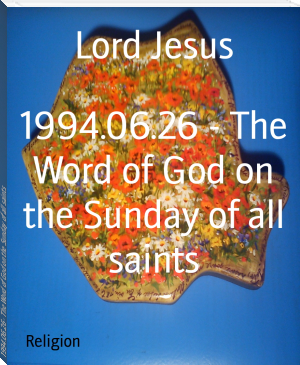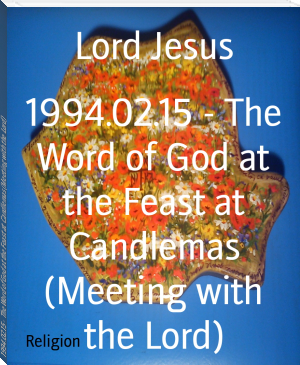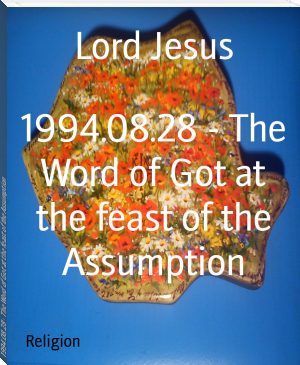Orthodoxy - G. K. Chesterton (books to read to get smarter .TXT) 📗

- Author: G. K. Chesterton
- Performer: -
Book online «Orthodoxy - G. K. Chesterton (books to read to get smarter .TXT) 📗». Author G. K. Chesterton
In case any reader has not come across the thing I mean, I will give such instances as I remember at random of this self-contradiction in the sceptical attack. I give four or five of them; there are fifty more.
Thus, for instance, I was much moved by the eloquent attack on Christianity as a thing of inhuman gloom; for I thought (and still think) sincere pessimism the unpardonable sin.
Insincere pessimism is a social accomplishment, rather agreeable than otherwise; and fortunately nearly all pessimism is insincere.
But if Christianity was, as these people said, a thing purely pessimistic and opposed to life, then I was quite prepared to blow up St. Paul’s Cathedral. But the extraordinary thing is this.
They did prove to me in Chapter I. (to my complete satisfaction) that Christianity was too pessimistic; and then, in Chapter II., they began to prove to me that it was a great deal too optimistic.
One accusation against Christianity was that it prevented men, by morbid tears and terrors, from seeking joy and liberty in the bosom of Nature. But another accusation was that it comforted men with a fictitious providence, and put them in a pink-and-white nursery.
One great agnostic asked why Nature was not beautiful enough, and why it was hard to be free. Another great agnostic objected that Christian optimism, “the garment of make-believe woven by pious hands,” hid from us the fact that Nature was ugly, and that it was impossible to be free. One rationalist had hardly done calling Christianity a nightmare before another began to call it a fool’s paradise. This puzzled me; the charges seemed inconsistent.
Christianity could not at once be the black mask on a white world, and also the white mask on a black world. The state of the Christian could not be at once so comfortable that he was a coward to cling to it, and so uncomfortable that he was a fool to stand it.
If it falsified human vision it must falsify it one way or another; it could not wear both green and rose-coloured spectacles.
I rolled on my tongue with a terrible joy, as did all young men of that time, the taunts which Swinburne hurled at the dreariness of the creed—
“Thou hast conquered, O pale Galilaean, the world has grown gray with Thy breath.”
But when I read the same poet’s accounts of paganism (as in “Atalanta”), I gathered that the world was, if possible, more gray before the Galilean breathed on it than afterwards.
The poet maintained, indeed, in the abstract, that life itself was pitch dark. And yet, somehow, Christianity had darkened it.
The very man who denounced Christianity for pessimism was himself a pessimist. I thought there must be something wrong. And it did for one wild moment cross my mind that, perhaps, those might not be the very best judges of the relation of religion to happiness who, by their own account, had neither one nor the other.
It must be understood that I did not conclude hastily that the accusations were false or the accusers fools. I simply deduced that Christianity must be something even weirder and wickeder than they made out. A thing might have these two opposite vices; but it must be a rather queer thing if it did. A man might be too fat in one place and too thin in another; but he would be an odd shape.
At this point my thoughts were only of the odd shape of the Christian religion; I did not allege any odd shape in the rationalistic mind.
Here is another case of the same kind. I felt that a strong case against Christianity lay in the charge that there is something timid, monkish, and unmanly about all that is called “Christian,”
especially in its attitude towards resistance and fighting.
The great sceptics of the nineteenth century were largely virile.
Bradlaugh in an expansive way, Huxley, in a reticent way, were decidedly men. In comparison, it did seem tenable that there was something weak and over patient about Christian counsels.
The Gospel paradox about the other cheek, the fact that priests never fought, a hundred things made plausible the accusation that Christianity was an attempt to make a man too like a sheep.
I read it and believed it, and if I had read nothing different, I should have gone on believing it. But I read something very different.
I turned the next page in my agnostic manual, and my brain turned up-side down. Now I found that I was to hate Christianity not for fighting too little, but for fighting too much. Christianity, it seemed, was the mother of wars. Christianity had deluged the world with blood.
I had got thoroughly angry with the Christian, because he never was angry. And now I was told to be angry with him because his anger had been the most huge and horrible thing in human history; because his anger had soaked the earth and smoked to the sun.
The very people who reproached Christianity with the meekness and non-resistance of the monasteries were the very people who reproached it also with the violence and valour of the Crusades. It was the fault of poor old Christianity (somehow or other) both that Edward the Confessor did not fight and that Richard Coeur de Leon did.
The Quakers (we were told) were the only characteristic Christians; and yet the massacres of Cromwell and Alva were characteristic Christian crimes. What could it all mean? What was this Christianity which always forbade war and always produced wars? What could be the nature of the thing which one could abuse first because it would not fight, and second because it was always fighting?
In what world of riddles was born this monstrous murder and this monstrous meekness? The shape of Christianity grew a queerer shape every instant.
I take a third case; the strangest of all, because it involves the one real objection to the faith. The one real objection to the Christian religion is simply that it is one religion. The world is a big place, full of very different kinds of people. Christianity (it may reasonably be said) is one thing confined to one kind of people; it began in Palestine, it has practically stopped with Europe.
I was duly impressed with this argument in my youth, and I was much drawn towards the doctrine often preached in Ethical Societies—
I mean the doctrine that there is one great unconscious church of all humanity founded on the omnipresence of the human conscience.
Creeds, it was said, divided men; but at least morals united them.
The soul might seek the strangest and most remote lands and ages and still find essential ethical common sense. It might find Confucius under Eastern trees, and he would be writing “Thou shalt not steal.” It might decipher the darkest hieroglyphic on the most primeval desert, and the meaning when deciphered would be “Little boys should tell the truth.” I believed this doctrine of the brotherhood of all men in the possession of a moral sense, and I believe it still—with other things. And I was thoroughly annoyed with Christianity for suggesting (as I supposed) that whole ages and empires of men had utterly escaped this light of justice and reason. But then I found an astonishing thing.
I found that the very people who said that mankind was one church from Plato to Emerson were the very people who said that morality had changed altogether, and that what was right in one age was wrong in another. If I asked, say, for an altar, I was told that we needed none, for men our brothers gave us clear oracles and one creed in their universal customs and ideals. But if I mildly pointed out that one of men’s universal customs was to have an altar, then my agnostic teachers turned clean round and told me that men had always been in darkness and the superstitions of savages.
I found it was their daily taunt against Christianity that it was the light of one people and had left all others to die in the dark.
But I also found that it was their special boast for themselves that science and progress were the discovery of one people, and that all other peoples had died in the dark. Their chief insult to Christianity was actually their chief compliment to themselves, and there seemed to be a strange unfairness about all their relative insistence on the two things. When considering some pagan or agnostic, we were to remember that all men had one religion; when considering some mystic or spiritualist, we were only to consider what absurd religions some men had. We could trust the ethics of Epictetus, because ethics had never changed. We must not trust the ethics of Bossuet, because ethics had changed. They changed in two hundred years, but not in two thousand.
This began to be alarming. It looked not so much as if Christianity was bad enough to include any vices, but rather as if any stick was good enough to beat Christianity with.
What again could this astonishing thing be like which people were so anxious to contradict, that in doing so they did not mind contradicting themselves? I saw the same thing on every side.
I can give no further space to this discussion of it in detail; but lest any one supposes that I have unfairly selected three accidental cases I will run briefly through a few others.
Thus, certain sceptics wrote that the great crime of Christianity had been its attack on the family; it had dragged women to the loneliness and contemplation of the cloister, away from their homes and their children. But, then, other sceptics (slightly more advanced) said that the great crime of Christianity was forcing the family and marriage upon us; that it doomed women to the drudgery of their homes and children, and forbade them loneliness and contemplation.
The charge was actually reversed. Or, again, certain phrases in the Epistles or the marriage service, were said by the anti-Christians to show contempt for woman’s intellect. But I found that the anti-Christians themselves had a contempt for woman’s intellect; for it was their great sneer at the Church on the Continent that “only women” went to it. Or again, Christianity was reproached with its naked and hungry habits; with its sackcloth and dried peas.
But the next minute Christianity was being reproached with its pomp and its ritualism; its shrines of porphyry and its robes of gold.
It was abused for being too plain and for being too coloured.
Again Christianity had always been accused of restraining sexuality too much, when Bradlaugh the Malthusian discovered that it restrained it too little. It is often accused in the same breath of prim respectability and of religious extravagance. Between the covers of the same atheistic pamphlet I have found the faith rebuked for its disunion, “One thinks one thing, and one another,”
and rebuked also for its union, “It is difference of opinion that prevents the world from going to the dogs.” In the same conversation a freethinker, a friend of mine, blamed Christianity for despising Jews, and then despised it himself for being Jewish.
I wished to be quite fair then, and I wish to be quite fair now; and I did not conclude that the attack on Christianity was all wrong.
I only concluded that if Christianity was wrong, it was very wrong indeed. Such hostile horrors might be combined in one thing, but that thing must be very strange and solitary. There are men who are misers, and also spendthrifts; but they are rare. There are men sensual and also ascetic; but they are rare. But if this mass of mad





Comments (0)